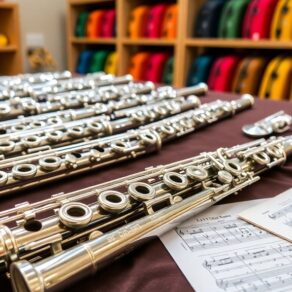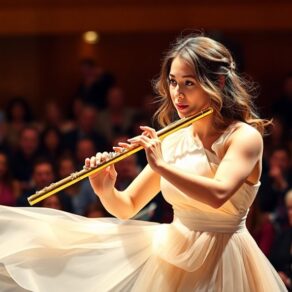When exploring the 7 best renowned players in musical history, you can't overlook Jean-Pierre Rampal and James Galway, who transformed the flute's role in classical music. Julius Baker set standards in pedagogy, fostering a new generation of flutists. Sir James Galway captivated audiences with his virtuosic technique. Contemporary influencers like Jacques Zoon and Robert Dick expanded the flute's repertoire and techniques, merging genres and deepening musical expression. Clément Dufour's unique compositions reflect a blend of styles. Each of these artists not only excelled in performance but also enriched the musical landscape, guiding future musicians towards innovative paths.
Key Takeaways
- Jean-Pierre Rampal transformed the flute's role in classical music, elevating its status and inspiring flutists worldwide with his innovative techniques.
- James Galway's charismatic performances and technical brilliance captivated audiences, making him a celebrated figure across various musical genres.
- Julius Baker set new standards in flute pedagogy, prioritizing artistic expression and individual learning styles to nurture future generations of flutists.
- Robert Dick revolutionized contemporary flute music with extended techniques, blending jazz and avant-garde styles to redefine the instrument's capabilities.
- Jacques Zoon's innovative interpretations and commitment to inclusivity in music have greatly influenced modern flute performance and repertoire expansion.
Jean-Pierre Rampal
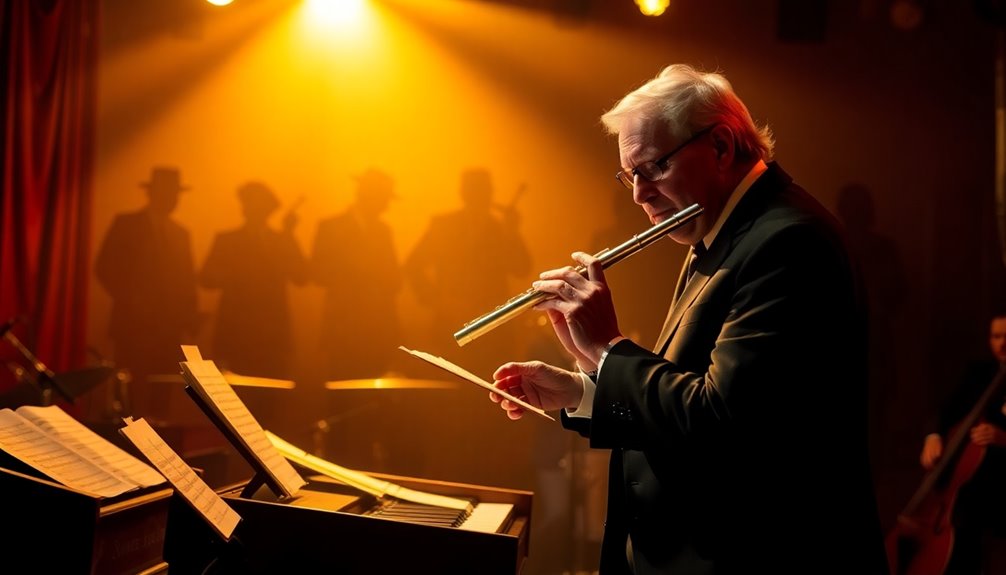
Jean-Pierre Rampal was one of the most influential flutists of the 20th century, revolutionizing the perception of the flute in classical music. His mastery of flute techniques set a new standard, allowing the instrument to shine in ways previously unimagined. He didn't just play the flute; he breathed life into it, enchanting audiences with his lyrical interpretations and dynamic expressiveness.
Rampal's classical influence extended beyond performance; he inspired a generation of flutists to explore and expand their own capabilities. By embracing a diverse repertoire that included Baroque, Classical, Romantic, and contemporary works, he demonstrated the flute's versatility. You can see how he elevated the instrument through his innovative use of articulation, vibrato, and phrasing, which breathed new dimensions into traditional compositions.
As you investigate Rampal's music, you'll notice how he effortlessly merged technical prowess with emotional depth. His recordings, including collaborations with renowned orchestras, showcase a level of artistry that invites listeners to connect on a profound level. This connection is essential—Rampal's contribution to the flute wasn't just about technique; it was about creating a sense of belonging within the classical music community. Additionally, his performances often reflected the emotional resonance found in traditional flute melodies, showcasing the power of storytelling through music.
Rampal's legacy continues to inspire flutists around the world, encouraging them to explore the full potential of their instrument. His work illustrates that the flute can be a powerful voice in classical music, one that resonates with beauty, passion, and authenticity.
James Galway
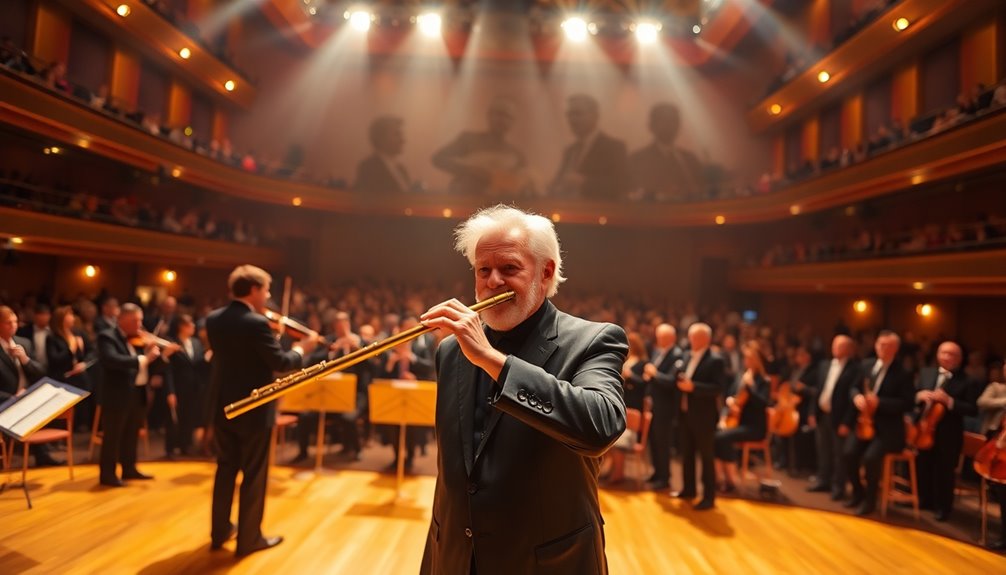
While many flutists have left their mark on the music world, James Galway stands out for his unique blend of technical brilliance and charismatic stage presence. You can't help but be captivated by his enchanting performances, which showcase a remarkable mastery of flute techniques. Galway's ability to seamlessly fuse classical and contemporary styles has made him a beloved figure in the musical community.
His extensive musical collaborations have further enriched his career. Partnering with artists across genres—from symphony orchestras to pop icons—Galway has expanded the flute's presence in diverse musical landscapes. This willingness to bridge genres speaks to his commitment to musical innovation and inclusivity.
Here's a snapshot of his contributions to music:
| Aspect | Description |
|---|---|
| Flute Techniques | Mastery of vibrato, breath control, and articulation. |
| Musical Collaborations | Works with artists like Sir James Galway, Andrea Bocelli, and more. |
| Influence on the Flute | Revitalized interest in the flute as a solo instrument. |
| Awards and Recognitions | Grammy Awards and numerous accolades for his contributions. |
Galway's influence extends beyond performance; he serves as a mentor, inspiring young flutists. His workshops and masterclasses create a sense of community, fostering a love for music that resonates deeply with aspiring musicians. By celebrating both tradition and innovation, Galway invites you to join him in a shared appreciation for the flute, making his legacy accessible to all. His commitment to mastering advanced flute techniques enhances the expressiveness and creativity of his performances, setting a benchmark for flutists around the world.
Julius Baker
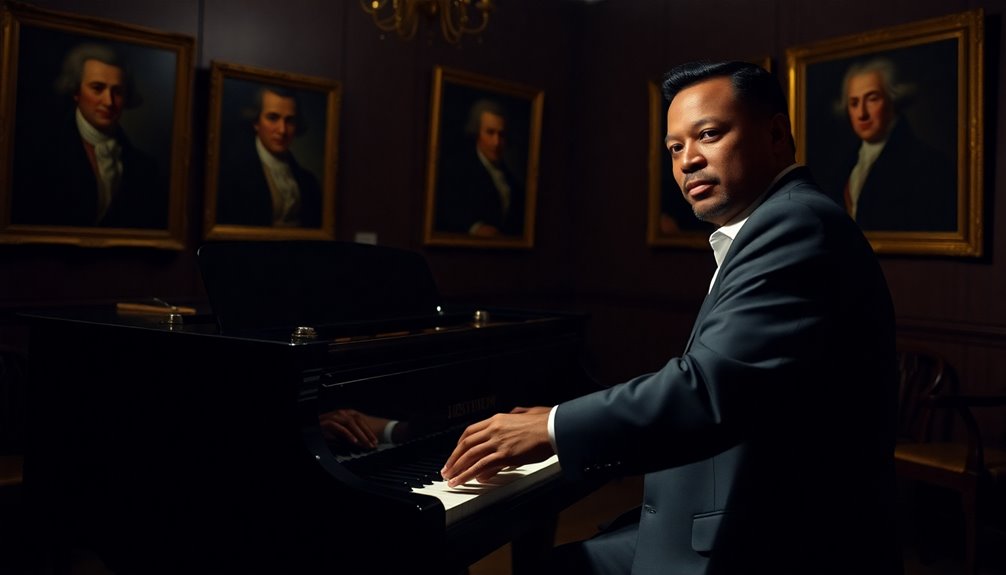
Within the domain of flute pedagogy, Julius Baker emerges as a pivotal figure whose influence shaped generations of flutists. His teaching legacy is profound, characterized by an approach that blended technical precision with artistic expression.
You'll find that Baker's influence extends beyond his own students, impacting the broader landscape of flute playing and pedagogy.
Here are four key aspects of Baker's contribution to music education:
- Innovative Techniques: Baker developed unique exercises that enhanced tone quality and breath control, setting a new standard for flutists.
- Student-Centric Approach: He prioritized individual learning styles, fostering an environment where students felt valued and understood.
- Masterful Communication: Baker's ability to articulate complex concepts in simple terms made his teachings accessible to all levels of flutists.
- Mentorship: Many of his students went on to become influential teachers themselves, thereby perpetuating Baker's teaching legacy throughout the music community.
Baker's influence isn't just limited to his direct contributions; it resonates through the countless flutists who carry his teachings forward.
His commitment to fostering excellence and creativity in music has left an indelible mark. Additionally, his emphasis on proper embouchure as a fundamental element in sound production is a concept that remains vital in flute pedagogy today.
As you explore the world of flute pedagogy, understanding Baker's role provides valuable context, helping you appreciate the evolution of flute playing and the community of artists it nurtures.
Embracing his principles can lead you to a richer, more fulfilling musical journey.
Sir James Galway
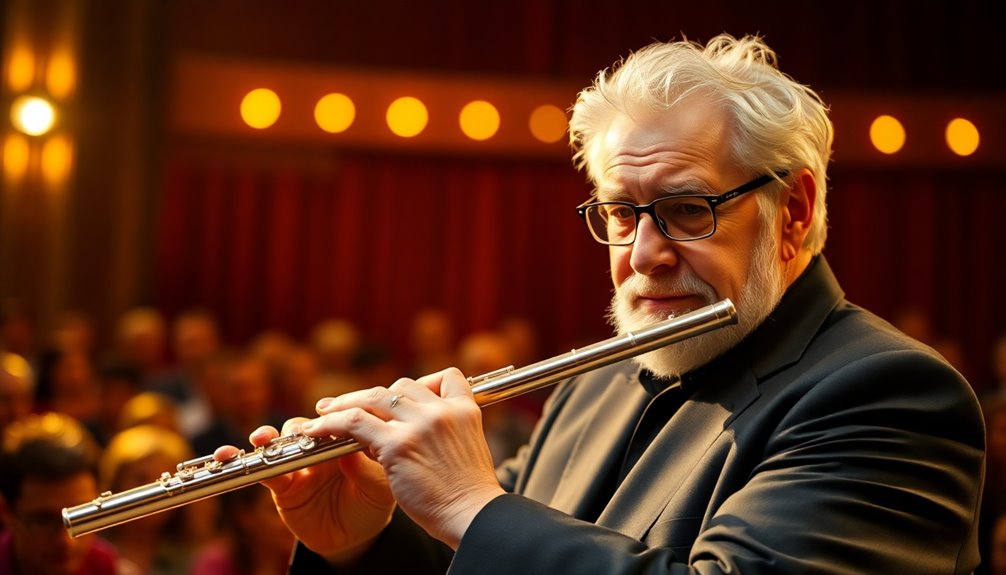
Sir James Galway stands as a towering figure in the world of flute performance, renowned for his virtuosic technique and charismatic stage presence. His ability to captivate audiences during concert performances is unmatched, making him a beloved figure in the music community. You can often find his signature style blending classical and contemporary genres, showcasing his exceptional flute techniques that have inspired countless musicians.
To better understand Galway's influence, consider the following table:
| Aspect | Description |
|---|---|
| Flute Techniques | Mastery of tone production and vibrato |
| Concert Performances | Engaging and emotive interpretations |
| Collaborations | Work with diverse musicians and ensembles |
Galway's technique is characterized by remarkable breath control and precision. This enables him to effortlessly navigate complex passages, making even the most challenging pieces seem accessible. His unique sound, often described as warm and inviting, draws listeners into each performance, creating a sense of belonging within the audience. Additionally, his performances often highlight the flute's durability and longevity, showcasing the instrument's ability to withstand the test of time in both technique and artistry.
The impact of Galway's concert performances extends beyond mere entertainment; he has played a significant role in elevating the flute's status as a solo instrument. By showcasing its versatility, he's opened doors for future generations of flutists. In a world where musical expression often feels fragmented, Galway's artistry fosters a sense of unity, reminding us of the power of music to connect us all. His contributions have truly left an indelible mark on the landscape of flute performance.
Jacques Zoon
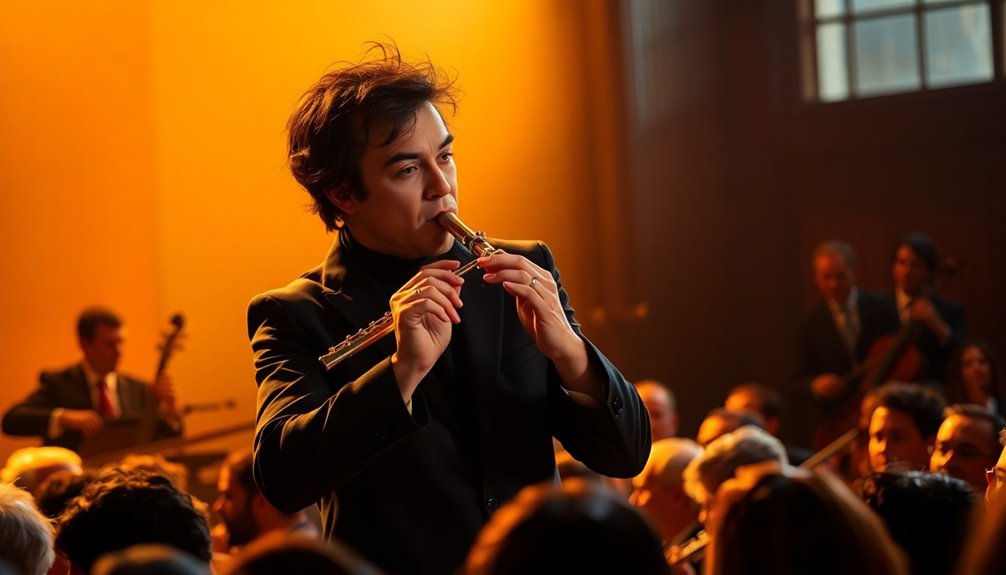
Building on the legacy of renowned flutists like Sir James Galway, Jacques Zoon emerges as a pivotal figure in contemporary flute performance. His contributions extend beyond mere technique; they shape the very fabric of flute artistry today.
Zoon's influence has transformed how flutists approach their craft, inspiring countless musicians to explore new domains of expression.
Here are four key aspects of Zoon's artistry that you should appreciate:
- Zoon's Technique: His remarkable control and precision redefine what's possible on the flute. He employs unique breath control and finger positioning, enabling him to execute complex passages with remarkable fluidity.
- Innovative Repertoire: Zoon champions contemporary works, bringing lesser-known compositions to the spotlight. This willingness to experiment invites flutists to expand their repertoire and engage with modern music.
- Teaching Philosophy: As a dedicated educator, Zoon emphasizes the importance of emotional connection in performance. He encourages students to find their own voice, fostering a sense of belonging in the musical community.
- Collaborative Spirit: Zoon often collaborates with other musicians and composers, illustrating the power of unity in the arts. His partnerships enrich the musical landscape and promote a sense of shared creativity. Additionally, he highlights the significance of breath control exercises that enhance tone and intonation, which are crucial for precise performances.
Robert Dick
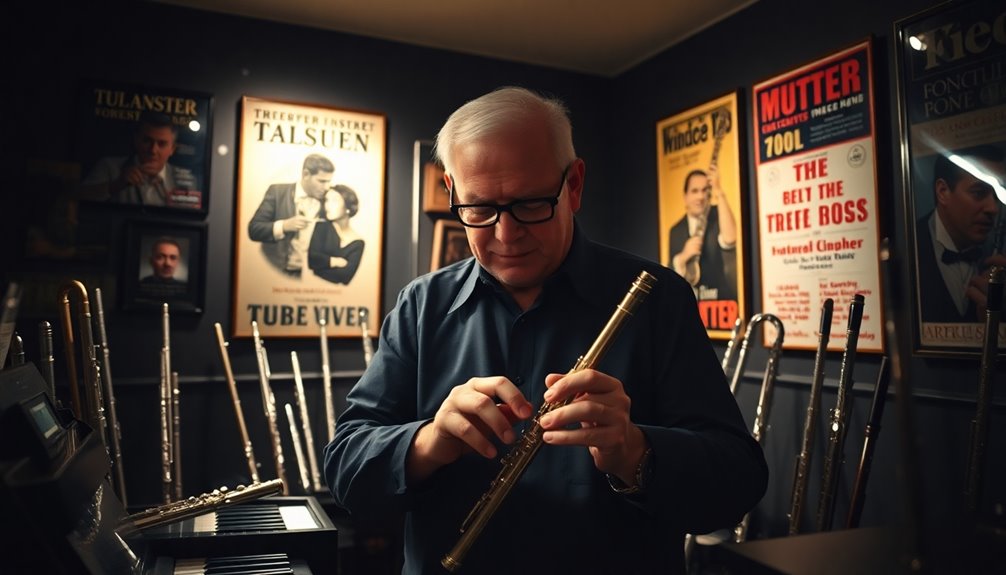
Renowned for his innovative approach to the flute, Robert Dick has carved out a unique niche in the domain of contemporary music. You might find it fascinating how Dick's techniques challenge traditional flute playing, incorporating multiphonics, extended techniques, and rich timbral variations. His work not only redefines the role of the flute in modern compositions but also invites flutists to explore new soundscapes that were once thought impossible.
Dick's influences are as varied as they're profound. He draws inspiration from diverse genres, including jazz, world music, and avant-garde compositions. This eclectic blend shapes his artistic vision and encourages flutists to think outside the conventional parameters of their instrument. By studying his work, you'll see how he integrates improvisation with structured compositions, creating a dynamic interplay that resonates with audiences.
What sets Robert Dick apart is his commitment to education and collaboration. He actively engages with emerging musicians, sharing his techniques and philosophies, which fosters a sense of community among flutists. This mentorship not only elevates the standard of flute performance but cultivates a supportive network where creativity flourishes. His emphasis on articulation techniques reflects how vital clarity and expression are in contemporary flute music.
In embracing Robert Dick's insights and methods, you're not just learning to play the flute; you're joining a movement that values innovation and exploration. His contributions are a reflection of the evolving landscape of music, and his legacy will certainly inspire future generations of musicians to push boundaries and redefine their craft.
Clément Dufour
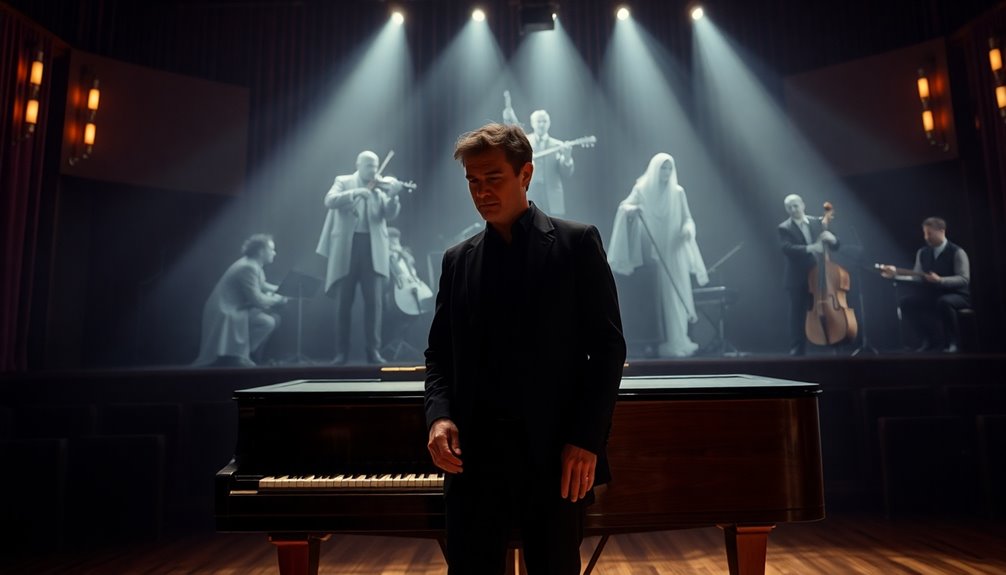
A significant figure in the domain of contemporary classical music, Clément Dufour has made a name for himself through his distinctive compositions that often blur the lines between genres.
His work not only showcases his remarkable talent but also highlights Clément Dufour's influence on a new generation of musicians. By pushing the boundaries of traditional music, he encourages you to explore the richness of sound and emotion. Additionally, Dufour frequently incorporates extended techniques in his performances, further enriching the listening experience.
Here are four key aspects of Dufour's techniques that you might find inspiring:
- Genre Fusion: Dufour often combines elements from classical music, jazz, and electronic genres, creating a unique auditory experience that captivates audiences.
- Innovative Instrumentation: He employs unconventional instruments and sound sources, expanding the palette available for compositions and inviting listeners to discover new textures.
- Dynamic Rhythms: Dufour's rhythmic structures are intricate yet accessible, inviting performers and audiences alike to engage deeply with the music.
- Emotional Depth: His works often evoke profound emotional responses, reflecting personal and universal themes that resonate with many.
Frequently Asked Questions
What Instruments Do These Renowned Players Primarily Play?
When you explore the world of renowned musicians, you'll notice they often specialize in specific instruments.
Many guitarists showcase unique guitar techniques, blending fingerpicking and strumming to create enchanting melodies.
On the other hand, pianists often adopt diverse piano styles, from classical to jazz, allowing them to express a wide range of emotions.
Understanding these instruments can deepen your appreciation for the artistry and skill behind the music you love.
How Did These Musicians Influence Modern Music?
You'll find that these musicians shaped modern music through their groundbreaking musical innovation and significant cultural impact.
By blending genres and experimenting with sounds, they pushed boundaries, influencing countless artists.
Their unique styles and approaches not only inspired new musical forms but also fostered a sense of community among listeners.
As you explore their legacies, you'll see how their contributions continue to resonate, creating a rich tapestry that connects diverse musical experiences today.
What Awards Have These Players Received Throughout Their Careers?
Did you know that some musicians have won over 20 Grammy Awards throughout their careers?
These award ceremonies celebrate notable achievements, recognizing the immense talent and influence these players bring to the music world.
From groundbreaking albums to unforgettable performances, their accolades reflect their dedication and impact.
Are Any of These Musicians Still Performing Today?
You might be surprised to learn that several of these musicians are still active in their craft, showcasing impressive musical longevity.
Their current performances continue to draw fans, reflecting their enduring appeal. Many have adapted to modern trends, blending classic styles with contemporary sounds, ensuring they remain relevant.
This dedication not only captivates audiences but also fosters a sense of belonging within the music community, allowing fans to connect across generations.
Where Can I Find Recordings of Their Performances?
To find recordings of their performances, you should explore various recording archives and performance platforms.
Websites like YouTube and Spotify often host a vast collection of live shows and studio albums.
Additionally, platforms like Apple Music and SoundCloud provide access to rare recordings.
Don't forget to check out specialized music archives or local libraries, where you might discover unique performances that connect you to the artists' legacies.
Conclusion
In exploring the legacies of these seven renowned players, you can see how each has shaped the musical landscape. Their unique contributions and mastery of the flute have resonated through time, much like a classic vinyl record spinning in a modern café. From Rampal's pioneering spirit to Galway's charismatic performances, these artists not only pushed boundaries but also inspired generations. Understanding their impact helps you appreciate the rich tapestry of musical history and the artistry that continues to thrive today.


